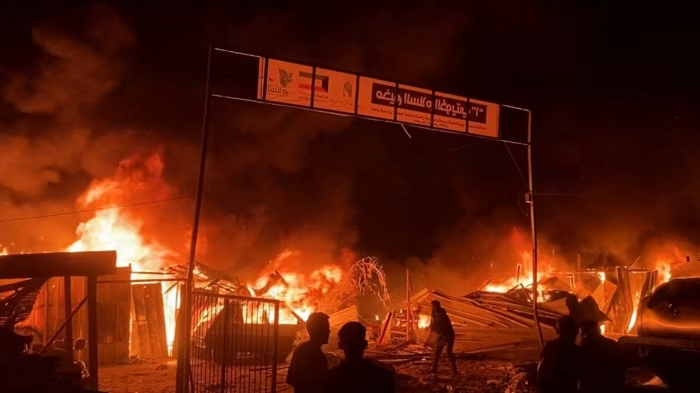The southern Gaza Strip city of Rafah has become the epicenter of a devastating tragedy. On Sunday, Israeli air strikes targeted an area where internally displaced civilians had sought refuge in tents. The result: at least 35 Palestinians killed and dozens more wounded. The majority of the victims were women and children, adding to the heart-wrenching toll of innocent lives lost.
The Strike and Its Aftermath
The Israeli military claimed that its air force had struck a Hamas compound in Rafah. However, the area hit was a camp for displaced people, as confirmed by Gaza officials and the Palestine Red Crescent Society. Videos shared on social media depict a large fire at the site, with paramedics and firefighters struggling to manage the aftermath. The targeted area included a large container that served as a shelter for dozens of families, surrounded by hundreds of tents.

Humanitarian Aid and the Crisis in Gaza
Amid this tragedy, humanitarian aid has been desperately needed. On the same day, 360 aid trucks entered Gaza, including 126 trucks from Egypt. These trucks carried essential supplies such as food, water, fuel, medical equipment, and medicine. The aid was transferred to the Gaza Strip after security checks by personnel from the Ministry of Defense Land Crossings Authority at the Kerem Shalom Crossing. This coordinated effort aimed to alleviate the dire humanitarian crisis unfolding in Gaza, exacerbated by Israel’s tight restrictions on ground deliveries and the closure of the Rafah crossing with Egypt
The Grim Reality
The situation in Gaza remains dire, and the loss of civilian lives in Rafah underscores the urgency of finding a peaceful resolution. As the world watches, we must remember that behind the numbers are real people—families torn apart, dreams shattered, and futures uncertain. The tragedy in Rafah serves as a stark reminder of the human cost of conflict, and it calls for renewed efforts toward lasting peace and justice.

In the face of such heartbreak, we must continue to advocate for compassion, empathy, and a commitment to prevent further loss of life. Let us hope that the international community can come together to find a path toward healing and reconciliation in this troubled region.





